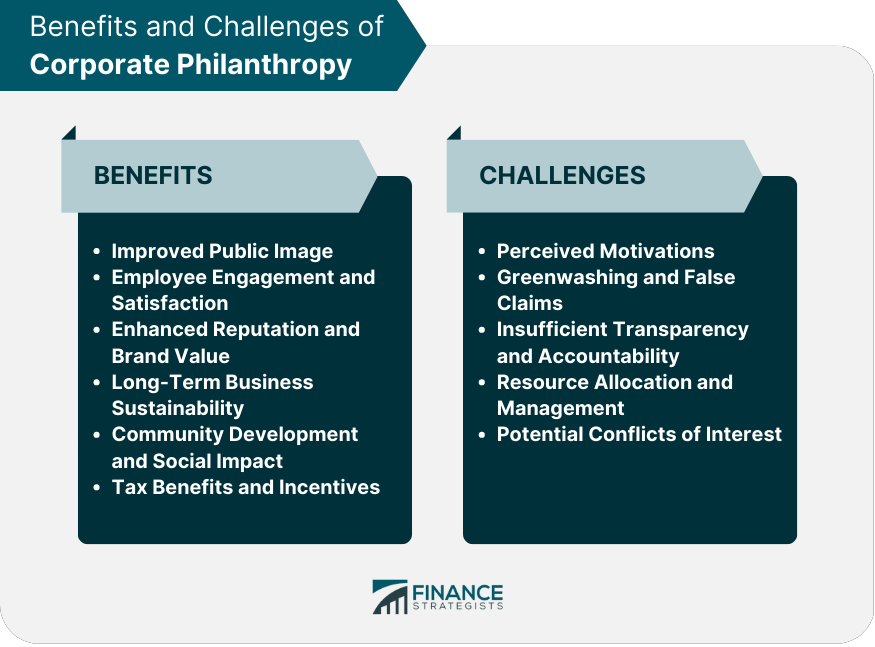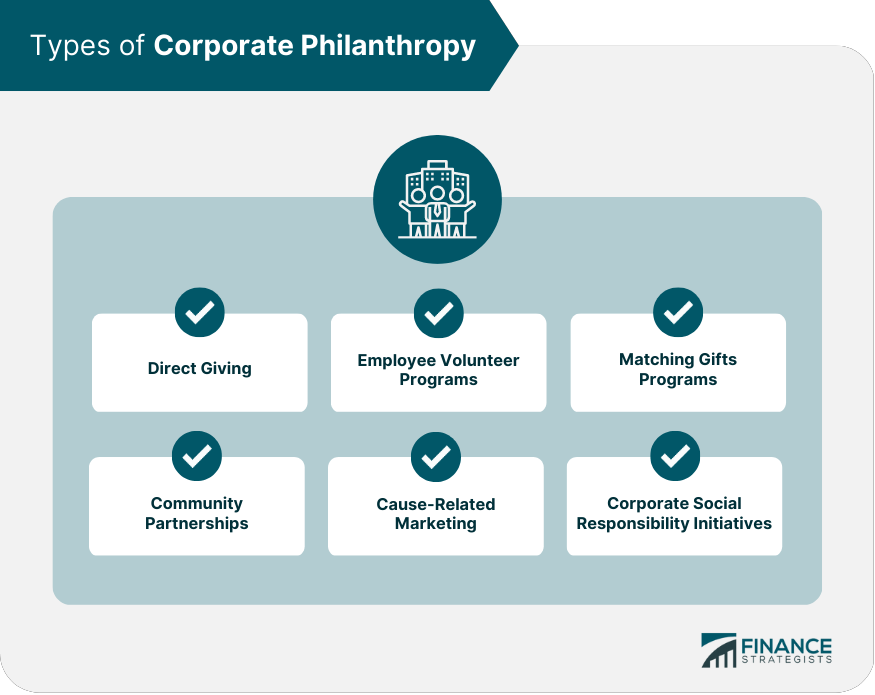Corporate philanthropy for social change: Best practices from grassroots to global
The Function of Company Philanthropy in Fostering Sustainable Organization Practices
Corporate philanthropy has arised as a crucial technique for organizations intending to integrate sustainability right into their operations. By aligning business purposes with social and ecological campaigns, companies can promote much healthier environments. This method not only boosts business online reputation yet also reinforces stakeholder connections. Nonetheless, real extent of its effect on lasting business success remains to be checked out. What ingenious practices are being taken on consequently?
Understanding Company Philanthropy and Its Significance
Business philanthropy offers as an essential device whereby companies can add to societal well-being while enhancing their very own credibilities. This method includes companies designating resources, such as funds, time, or competence, to sustain neighborhood initiatives, charitable reasons, or social programs. By involving in kind efforts, business can deal with pushing social concerns, such as education, health treatment, and environmental problems, therefore playing a crucial role in cultivating positive adjustment.
Furthermore, corporate philanthropy can boost worker spirits and draw in skill, as people significantly look for to help socially responsible companies. It can additionally enhance consumer commitment, as customers like brands that show a commitment to making a distinction. Inevitably, understanding the value of business philanthropy exists in acknowledging its dual advantages: enhancing neighborhood welfare while all at once improving company trustworthiness and credibility in the eyes of stakeholders. This placement of social duty with business rate of interests underscores its relevance in today's company landscape.
The Connection In Between Corporate Philanthropy and Sustainability
While lots of companies take part in philanthropy to improve their public photo, a deeper connection exists between corporate philanthropy and sustainability. Corporate philanthropy commonly lines up with sustainable methods by supporting initiatives that deal with environmental and social obstacles. When businesses spend in community jobs, renewable energy, or academic programs, they add to a healthier ecosystem and society. This commitment not only cultivates a good reputation yet likewise strengthens stakeholder relationships, improving brand commitment.

Case Researches: Successful Company Philanthropy Initiatives
Countless firms have effectively incorporated kind efforts into their service strategies, demonstrating the tangible benefits of such dedications. As an example, Microsoft has actually released various programs, such as its AI for Earth initiative, which supports environmental sustainability through modern technology. This technique not only aids conservation efforts however additionally improves Microsoft's credibility as a leader in company duty.
Likewise, Unilever's Lasting Living Strategy emphasizes social and ecological influence, straightening its philanthropy with business purposes. By funding projects that improve hygiene and hygiene, Unilever strengthens its brand name while adding to international wellness.
Another notable instance is Patagonia, which pledges 1% of sales to environmental causes. This dedication resonates with consumers, fostering loyalty and driving sales.
These study highlight that reliable corporate philanthropy can generate economic returns while advertising sustainable methods, enhancing the idea that moral business practices are beneficial for both culture and profits.
Structure Stronger Stakeholder Relationships Via Philanthropy
Philanthropy functions as a crucial device for companies seeking to reinforce their partnerships with stakeholders, as it cultivates count on and demonstrates a dedication to social responsibility. By involving in charitable efforts, services can link with neighborhood communities, boosting their reputation and encouraging stakeholder loyalty. This involvement often leads to significant communications, developing a feeling of shared worths between the firm and its stakeholders.
Philanthropic initiatives can resolve details community needs, permitting organizations to contribute favorably to societal obstacles. This participation not just showcases a business's honest stance see this here but likewise aids in attracting and retaining consumers who prioritize social responsibility.
Furthermore, employees frequently feel much more determined and engaged when they see their organization proactively taking part in humanitarian activities, bring about a much more efficient office society. Corporate philanthropy comes to be a critical avenue for developing more powerful, more resilient connections with varied stakeholder groups.
Gauging the Influence of Business Philanthropy on Company Success
The connection in between company philanthropy and stakeholder interaction sets the stage for assessing its influence on overall organization success. Organizations frequently gauge this influence via various metrics, including brand track record, worker satisfaction, and customer commitment. Philanthropic initiatives can improve a company's image, promoting trust fund amongst customers and financiers alike. Additionally, involved staff members tend to exhibit greater spirits and productivity, directly correlating to boosted organization efficiency.
Quantitative analysis can likewise be utilized, with companies evaluating monetary returns against philanthropic expenditures. Research indicates that business with strong philanthropic dedications commonly experience greater stock performance and lowered volatility. Additionally, qualitative assessments, such as stakeholder feedback, can supply understandings right into area perceptions and long-term relational benefits.
Eventually, measuring the impact of business philanthropy requires a diverse strategy, integrating both qualitative and measurable data to ensure a detailed understanding of its influence on service success. corporate philanthropy.
Frequently Asked Inquiries
Exactly How Can Small Companies Take Part In Business Philanthropy Successfully?

What Are Common Mistaken Beliefs About Company Philanthropy?

Exactly How Does Business Philanthropy Impact Worker Morale?
Corporate philanthropy positively affects staff member spirits by promoting a feeling of function, improving task satisfaction, and promoting loyalty. Workers frequently really feel much more involved and encouraged when their business adds to social causes, producing an encouraging work atmosphere.
What Are the Tax Obligation Advantages of Business Philanthropy for Services?
Corporate philanthropy offers significant tax obligation advantages for services, consisting of reductions on charitable payments and possible reductions in gross income. These rewards motivate business to involve in social campaigns while simultaneously boosting their monetary standing.
Just How Can Companies Select Efficient Philanthropic Partners?
Firms can choose reliable humanitarian partners by reviewing placement with their values, determining impact capacity, taking look at this now a look at monetary transparency, and fostering solid communication. This critical method improves partnership and assurances mutual benefits for both parties involved.
Company philanthropy serves as a vital system through which companies can contribute to social health while boosting their own reputations - corporate philanthropy. Ultimately, comprehending the significance of business philanthropy lies in recognizing its twin advantages: improving community welfare while simultaneously improving business trustworthiness and dependability in the eyes of stakeholders. While many firms involve in philanthropy to enhance their public picture, a much deeper connection exists between business philanthropy and sustainability. The link in between corporate philanthropy and stakeholder involvement establishes the stage for assessing its influence on total organization success. Company philanthropy offers substantial tax advantages for businesses, including reductions on philanthropic payments and prospective reductions in taxable income